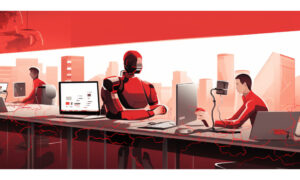Considering the impact of AI integration on employees
- 5 Min Read
There are many benefits for businesses who use AI in their business. However, there are many challenges companies face in integrating these new technologies before reaping the benefits.
- Author: Jonathan Rennie
- Date published: Aug 27, 2019
- Categories

Whether it is Amazon Robotics and their automated warehouse delivery robots, or companies such as Legal Sifter creating targeted document review systems, it is very evident that technology is impacting many employment sectors and encroaching on jobs performed by human employees. Jonathan Rennie, employment partner at UK law firm TLT considers the challenges these integrations may bring.
Technology can provide many companies with a competitive advantage and help deliver the best customer experience and often at a lower cost. On the flip side, there are concerns around the eroding of job security. There can be challenging issues around employee career progression and the extent to which new roles might be created and staff then redeployed or re-skilled rather than perhaps feeling threatened by potential job losses.
Younger staff are more likely to embrace any new technology introduced at work, as they’ll have a greater familiarity and educational experience in using these tools, whereas older employees may need greater support. There can be cross-generational conflicts around the application of technology that may require employers to be alert to employee relations issues around change management.
Those that are pro Artificial Intelligence (AI) state that the technology will take on the more repetitive, mundane tasks leaving human employees free to do the more important, comprehensive work. Therefore, the focus needs to be on retraining and reskilling the existing workforce to prepare people for emerging roles and ensure a smooth transition to an AI-enhanced workplace.
While the re-training and re-skilling of staff is the idealistic outcome of technology at work, the reality is that the use of technology could be a legitimate reason for implementing redundancy and restructuring projects, as there may be a diminishing or reduced need for employees in certain roles. Organisations will still need to have full employee consultation and abide by the existing legal obligations in looking for suitable alternative roles, so the increasing use of technology will not of itself make such redundancies fair in law. Nonetheless, one can readily understand that where a robot can carry out warehouse fulfilment and product delivery, there is a reduced need for human employees.
Understandably, many employees are taking it upon themselves to upskill or re-skill to protect themselves from technology threats to employment, having seen the technological evolution on the horizon. It may be that some enlightened employers provide that training proactively to staff, but there are many coding and programming courses promoting career upskilling and technology training to people who take responsibility for their own careers.
Employers may look to transition existing employees into new roles but should note that this can also have legal consequences as, if handled improperly, an employee could claim for constructive dismissal. If a current employment contract permits the employer to change an employee’s job duties, it would be sensible to ensure that other fundamental terms, such as hours of work, location, rate of pay and seniority are changed as little as possible.
Many organisations will have to train staff on how to work with and alongside the technology. This is essential to embedding the new technology in the business and making sure that staff see the benefits that it can deliver. The risk is that not everyone adapts well to change and while technology at work may provide for faster and more efficient operations, it may also lead to some collateral fallout where employees feel threatened or non-technology skills are seen as less valuable. Given that AI means that some of the technology tools are adaptive or self-learning, then we might expect there to be rapid change once the initial applications become more embedded in organisations.
In organisations where employees are represented by a union, there may be further considerations. Recognised trade unions have long had a say in the workplace about pay and working conditions through the mechanism of collective bargaining. As AI, Machine Learning and robotics have an increasing impact on our workplaces, the question is being asked about whether those traditional collective bargaining arrangements need to change to give unions a say on how and when new technology is introduced and what impact it will have on their members.
Unions know they can’t stop the tide of new technology and the issue for employers is how big a say they should have on the introduction of new technology, remembering that if they can’t agree, this is an issue which could ultimately result in industrial action.
Employers need to find a way to open a dialogue with their recognised union(s) to ensure that any new technology is successfully implemented in the workplace and that they get the maximum return from the investment they make on new technology. This could be through a New Technology Agreement, which is effectively a bolt on to the existing recognition agreement, or as an amendment to the existing agreement.
Although it’s clear that the introduction of AI and Machine Learning will have a profound effect on the labour force and there are many considerations to be made, the overall outlook is positive. Research paper The Future of Jobs 2018 states that 133 million new jobs are expected to be created globally by 2022 compared to 75 million that will be displaced.
Indeed, even in the legal market, we are seeing new technology coming to the fore: intelligent software solutions to assist the large scale review of documents and contract reviews and negotiations. But this is not about replacing individuals; it’s about lawyers developing new competencies and working with technology to enhance the client offering.
It’s clear that change is coming, it will just be a matter of finding an integration mechanism which works and is as future-proofed as possible, given the rapid pace of new technology development shows no signs of slowing.









